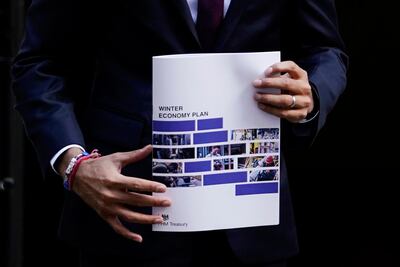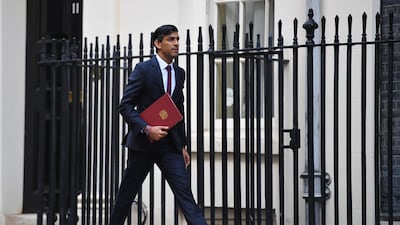Chancellor of the Exchequer Rishi Sunak set out the government’s new support scheme to save millions of jobs and businesses from a winter crisis on Thursday, as escalating Covid-19 cases placed the UK economy under further pressure.
Britain’s finance minister’s rescue plan included a series of new measures to bolster the economy including plans to subsidise staff wages, extended loans for businesses hit by coronavirus restrictions and more help with VAT payments.
Mr Sunak warned he could not save every job or every business and urged the country to brace itself for at least six months of hardship. The economy will therefore undergo a “more permanent adjustment,” he said.
“I cannot save every business, I cannot save every job. No chancellor could,” Mr Sunak said. “But what we can and must do is deal with the real problems businesses and employees are facing now.”
Mr Sunak acknowledged that Britons were “anxious” about further restrictions on their economic and social freedeoms and said the furlough scheme was the right policy at the right time and that there was no “harder” choice than the decision to end it.
"The Chancellor is being totally realistic about the economy," prime minister Boris Johnson said shortly after Mr Sunak's speech.
The UK has been forced to return to emergency measures amid escalating numbers of coronavirus cases and a surge in unemployment, with the new plan replacing the government’s furlough scheme, which paid 80 per cent of the wages of any employees placed on leave, is set to expire on October 31.
In total, 32 per cent of eligible jobs were furloughed through the government’s Coronavirus Job Retention Scheme for at least part of the period between March and June 2020, according to data from the Office for National Statistics on Thursday, with young people the most affected.
Mr Sunak said the government has delivered £190 million in economic support for people and businesses but that it was time to move into the “next phase” and roll out measures that deal with “the new normal”.
Under new restrictive measures unveiled by Mr Johnson earlier this week, pubs and restaurants must shut by 10pm and office workers have been encouraged to work from home.
The government’s new economic measures will see employers pay a third of the wages of staff in "viable jobs" who are forced to work lower hours due to reduced demand. For the hours not worked, the government and the employer will each pay one-third of their equivalent salary. The scheme will run for six months from November 1.
Meanwhile, business loans such as the 'bounce back' and 'coronavirus business interruption' support, will be extended until November 30.
A new 'Pay as You Grow' system allows businesses to repay their loans over a period of up to 10 years or switch to interest-only repayments for six months. To date, more than 1 million businesses have taken out a bounce back loan, with an average loan size of £30,000, HM Treasury said.
Mr Sunak will also extend a cut to value-added tax for hotels, cafes and restaurants until March 31 to support the hospitality and tourism sectors which are struggling with demand.
“The chancellor has listened to our consistent calls for an extension of business lending schemes, more flexible repayment terms for loans, and tax forbearance measures," said Adam Marshall, director general at the British Chambers of Commerce. "With almost 40 per cent of our firms saying they have three months cash in reserve or less, this will lessen the immediate pressure and provide reassurance for many affected firms at a challenging time."

Analysts said the Chancellor's policy measures will go some way to cushioning the blow to the economic recovery from the new restrictions to contain Covid-19 and limiting the long-term hit to unemployment.
"But these actions won’t eliminate the hit entirely. That is why we think gross domestic product will stagnate in the last three months of the year and take until end-2022 to return to its pre-crisis level," said Capital Economics in a research note.
Supplying extra state funds now to cover wages and company loans will put further pressure on the government’s finances.
Struggling businesses were only just getting back on their feet after the UK's first national lockdown saw the country slip into its first recession since 2009 in the second quarter of this year, posting a record 20.2 per cent contraction in the gross domestic product. In comparison, the largest quarterly decline during the 2008 recession was 2.1 per cent. The UK economy was "disproportionally hurt", according to analysts with GDP in the eurozone falling by a record 12.1 per cent over the same period.
Britain's unemployment rate jumped above 4 per cent in the second quarter of the year as the effects of the Covid-19 pandemic took hold, according to the Office for National Statistics – the first increase since the coronavirus lockdown began in March.
Earlier in the week Whitbred, which owns Premier Inn and Beefeater and still has 27,000 staff paid by the furlough, warned that 6,000 staff could lose their jobs. Pub chain JD Wetherspoon said half its 1,000 staff that work at airport venues were at risk. Meanwhile, cinema chain Cineworld said on Thursday it had swung to a £1.6 billion loss for the six months to June as movie theatres were closed during the lockdown.


